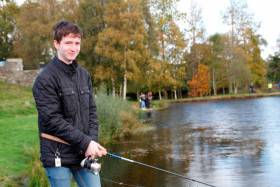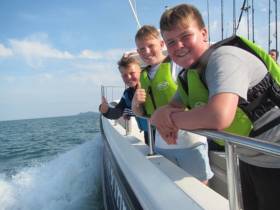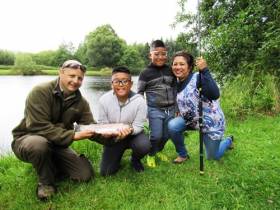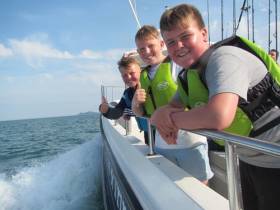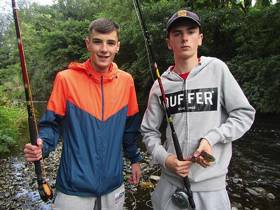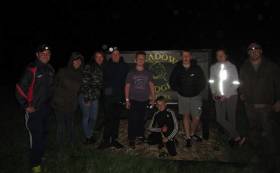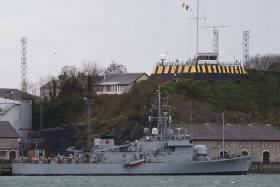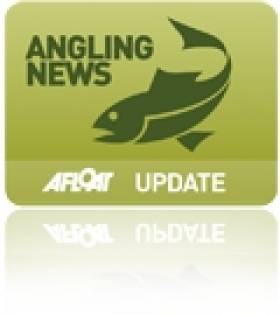Displaying items by tag: Dublin Angling Initiative
Inland Fisheries Ireland (IFI) has launched an open call for youth clubs, community groups and schools in the greater Dublin area to take part in its local fishing programme, the Dublin Angling Initiative.
The project aims to promote, develop and improve angling among children and young people. In 2023 IFI is once again looking for interested parties for the summer, autumn and winter months to learn how to fish.
Speaking about the call, Brian Beckett, director of the Eastern River Basin District at IFI said: “In 2022 we took over 600 young people from the Dublin area out fishing. We are asking youth clubs, community groups as well as national and secondary schools to get in touch if they would like to try out a new hobby and learn skills for life.
“As well as learning a new skill, there are the additional health and wellbeing benefits of taking part in an outdoor activity and disconnecting from the online world.
“The initiative introduces young people to the pursuit, giving access to fishing equipment, guidance around how and where to fish and builds awareness about the importance of protecting and conserving our fisheries resource and its wonderful biodiversity.”
The project offers children and young people of all abilities an opportunity to take fishing lessons, participate in fishing trips and enjoy family fishing days.
Interested clubs, schools or groups can contact IFI’s DAI co-ordinator Rory Keatinge by email at [email protected] or by phone at 087 614 2906.
Call for Young People to Take Up Angling in 2021
Inland Fisheries Ireland’s Dublin Angling Initiative is calling on youth clubs, community groups and schools in the Greater Dublin Area to take part in its 2021 fishing programme.
The initiative aims to promote, develop and improve angling among children and young people. In 2021, Inland Fisheries Ireland (IFI) is looking for interested parties for the summer, autumn and winter months to take part in the programme.
In 2019, over 400 children and young people took part in the fishing programme which caters for anyone interested in angling, from the complete novice to the more advanced angler with exposure given to each of the different types of fishing.
Children and young people are offered an opportunity to take fishing lessons, participate in fishing trips and enjoy family fishing days.
In addition to practical fishing exercises, the initiative offers fishing presentations and tours providing an insight into fish, their habitat, conservation measures and education regarding local fishing areas.
‘Fishing is a pastime which can be enjoyed at any age or ability’
The Dublin Angling Initiative has seen thousands of young people participate over the past 20 years, resulting in the establishment of many new fishing clubs.
Brian Beckett, director of the Eastern River Basin District, said: “We are calling on youth clubs, community groups as well as national and secondary schools who would like to try out a new hobby.
“Fishing is a pastime which can be enjoyed at any age or ability. The Dublin Angling initiative introduces young people to the pursuit, giving access to fishing equipment, guidance around how and where to fish and builds awareness about the importance of protecting and conserving our fisheries resource and the broader aquatic environment.
“Along with learning a new skill there are the additional health and wellbeing benefits of taking part in an outdoor activity and disconnecting from the online world. We are opening our call for youth clubs to book in for this year to get an opportunity to take part in this unique initiative.”
The 2021 Dublin Angling Initiative will include coarse, sea and game angling along with educational trips, where COVID-19 public health guidelines allow. Interested groups should contact by email [email protected] or apply online.

Dublin Angling Initiative Hosts Annual Sean McMorrow Memorial Fishing Competition for Novices
Over 30 young people participated in the annual Sean McMorrow Memorial fishing competition held by Inland Fisheries Ireland’s (IFI) Dublin Angling Initiative earlier this week.
This year’s venue on Tuesday 29 October was the Angling for All facility in Aughrim, Co Wicklow with the boys’ team from the Killinarden Angling Initiative in Tallaght winning on the day.
Young people from a range of youth groups and services took part in the competition, including the WAY project in Wicklow; Sphere 17 in Darndale and Priorswood; Whitechurch youth project; Jobstown Action for Youth (JAY) in Dublin 24; and James St CBS in Dublin’s South Inner Cit.
All competitors have participated in the Dublin Angling Initiative’s courses, which cover different types of fishing and enable participants to learn angling skills, many of them for the first time.
IFI runs the annual Sean McMorrow Memorial as a way for young people to come together and showcase their new skills and compete for fun. The young people were mentored by a team of IFI staff and Dublin Angling Initiative volunteers, who were able to ensure all fish were released back into the water.
Speaking about the competition, Brian Beckett, director of the Eastern River Basin District, said: “We run this competition as a highlight for the young people who have taken part in the fishing programme throughout the summer. It’s something we all look forward to as its great fun on the day and everyone enjoys themselves.
“The Dublin Angling Initiative gives participants the chance to take up a fishing rod and experience what fishing is all about and this event really showcases the experience which we want to create.”
The Dublin Angling Initiative is an outreach and educational fishing programme which aims to promote and develop angling among young people in the greater Dublin area. It caters for anyone interested in angling, from the complete novice to the more advanced angler, and trains them in different types of fishing.
Young people who take part in the initiative are educated in the various species of fish, their habitats, the importance of catch and release of our fish species and broader conservation.
IFI’s Dublin Angling Initiative has seen thousands of young people participate in the programme since it was founded over 20 years ago. The initiative has resulted in many of these young people setting up their own fishing clubs.
This year, the youth programme is operating throughout the autumn months and interested youth groups, schools and angling clubs are invited to apply.
To find out more, contact Dublin Angling Initiative co-ordinator Rory Keatinge at [email protected] or call 087 614 2906. All requests will be subject to availability as places are limited.
#Angling - Inland Fisheries Ireland (IFI) is calling on youth clubs, community groups and schools in the Greater Dublin Area to take part in its Dublin Angling Initiative.
The fishing programme aims to promote, develop and improve angling among children and young people in the city and surrounds.
Last year, more than 420 children and young people took part in the programme which caters for anyone interested in angling, from the complete novice to the more advanced angler, with exposure given to each of the different types of fishing.
The initiative offers children and young people an opportunity to take fishing lessons, participate in fishing trips and enjoy family fishing days.
In addition to practical fishing exercises, presentations and tours provide an insight into fish, their habitat, conservation measures and education regarding local fishing areas.
IFI’s Dublin Angling Initiative has seen thousands of young people participate over the past 20 years, resulting in the establishment of many new fishing clubs.
Brian Beckett, IFI director of the Eastern River Basin District, said: “We are calling on youth clubs, community groups as well as national and secondary schools who would like to try out a new hobby this summer.
“Fishing is a pastime which can be enjoyed at any age or ability. The Dublin Angling initiative introduces young people to the pursuit, giving access to fishing equipment, guidance around how and where to fish and building awareness around the importance of protecting and conserving our fisheries resource and the broader aquatic environment.”
Some availability remains for angling activities in August, September and October, and IFI invites any groups who are interested to get in touch without delay as places are limited. Interested groups should contact Rory Keatinge, co-ordinator of the Dublin Angling Initiative, at [email protected] or 087 614 2906.
#Angling - Over 420 children and young people from the Greater Dublin Area have taken up angling in the past year, according to Inland Fisheries Ireland’s Dublin Angling Initiative.
The programme which aims to promote, develop and improve angling in the Dublin area says it has seen significant demand for its services during 2017.
Young people from the areas of Tallaght, Whitechurch, Darndale and Blanchardstown, as well as those participating in inner city youth projects, took part in last year’s programme that saw them take fishing lessons, participate in fishing trips and competitions, and enjoy family fishing days at various community events.
This included two youth events organised in memory of the late Sean McMorrow, who was a member of the Inland Fisheries Trust and who donated funds towards the development of youth angling.
Environmental talks and lessons were also held with many national and secondary schools, with summer project and youth services taking part in the programme during the summer months.
The Dublin Angling Initiative caters for anyone interested in angling, from the complete novice to the more advanced angler, with exposure given to each of the different types of fishing.
Fishing presentations and tours provide an insight into fish, their habitat, conservation measures and education regarding local fishing areas.
The programme has seen thousands of young people participate in the programme since its inception over 20 years ago. The initiative has also been a catalyst for the founding of many fishing clubs by these young people, IFI says.
“The Dublin Angling Initiative offers a great opportunity to our young people to come outdoors and try and catch a fish,” added Brian Beckett, IFI director of the Eastern River Basin District. “We’re delighted to see so many young people out fishing during the summer months.
“Fishing is a hobby that can be enjoyed at any age or ability, in urban and rural settings and it has a wealth of benefits not least of which relate to overall health and well-being. The project provides an opportunity for those who may never have fished before to take up angling and our hope is that, for some, this will become a lifelong hobby.”
IFI chief executive Ciaran Byrne also commented on the importance of introducing young people to Ireland’s unique fisheries resource.
“Building awareness and understanding of the importance of protection and conservation of the resource is a key message of the Dublin Angling Initiative. We hope that these young people will bring this appreciation of the resource with them into later life.”
The Dublin Angling Initiative welcomes enquiries from all groups or individuals interested in its programmes and services. For further information, visit www.fisheriesireland.ie.
#Angling - Young people from Darndale and Whitechurch in Dublin were among the first groups to get out fishing as part of the Dublin Angling Initiative’s 2017 summer season.
Sphere 17 Youth Services from Darndale in North Dublin took a Fish & Trips charter boat for a few hours of sea angling.
The group spent the evening learning how to fish beside Lambay Island, catching pollock and mackerel — and while fishing they also reported seeing plenty of local birds and seals, as well as wallabies and deer on the island.
The fishing trip was one of six over the past month with the group also enjoying lessons in coarse and game fishing.
Meanwhile, Southside youth group Whitechurch Youth Services were taken to Courtlough Fisheries in Balbriggan where they were coached in bubble and fly fishing for trout. Participants learned about fish handling and catch and release fishing.
In addition to fishing lessons and field trips, Inland Fisheries Ireland’s Dublin Angling Initiative (DAI) has also been attending community events with a view to introducing young people to the fisheries resource in their own locality.
At the recent Chapelizod Community Festival, 16 young people between the ages of 10 and 15 enjoyed an environmental and history lesson on the River Liffey that runs through their community from fisheries staff.
That was followed by a more practical session of sampling and identifying invertebrates, plus an opportunity to examine juvenile trout and salmon taken from the river before being safely released again, as well as a fly fishing lesson.
“Angling is a hobby that can be enjoyed in an urban location such as Dublin at any age or ability,” said DAI co-ordinator Oisin Cahill. “We hope that the young people who participate in the programme and who are introduced to fishing will continue to enjoy it into later life.”
Anyone interested in learning more about the DAI should contact Oisin Cahill at [email protected] — enquiries are welcome from any groups or individuals interested in the programme, and availability will be on a first come, first served basis.
Fishing For Beginners With Whitechurch Youth Group Hailed A Success
#Angling - Whitechurch Youth Group from Rathfarnham in Dublin has once again taken up angling as part of Inland Fisheries Ireland’s Dublin Angling Initiative (DAI).
The youth group recently embarked on lessons in the basics of fly fishing, one of the most popular forms of angling.
Students picked up the basics of fly fishing equipment, fly tying and fly casting very quickly. And after a couple of lessons on dry land in Whitechurch, they were ready to go to the river bank and put their skills into practice at a popular angling spot in Milltown.
That’s where Matthew McDonald caught a wild brown trout assisted by his friend Nicky O’Hagan on their first fishing trip with the DAI.
Whitechurch Youth Group previously ran a fly-tying programme for fly fishing during the Winter months for several years. After a two year break from fly-tying, they have decided to re-introduce it to the youth group’s programme over the next few months.
IFI’s initiative offers young people from national and secondary schools, summer projects and youth services the opportunity to attend fishing courses throughout the summer.
Among them are young people from the Sphere 17 youth group in Darndale, North Dublin, who took part in a nighttime fishing event in Maynooth recently.
To date, thousands of young people have been introduced to sea, coarse and game angling and the initiative has been a catalyst in setting up fishing clubs for young people throughout the country.
“We have partnered with Whitechurch Youth Group for many years in showing young people what fishing is all about,” said DAI co-ordinator Oisin Cahill. “Fly Fishing is a particularly enjoyable type of fishing and it was great to see how quickly the youth group members picked up the art of fly tying and casting.
“Fishing is a hobby which can be enjoyed at any age. It is fantastic to see so many young people take up angling through the Dublin Angling Initiative.
“We would encourage anyone interested to try it out and discover a pastime which will have a positive impact on your health and wellbeing as well as being good fun.”
For further information on the DAI, visit www.fisheriesireland.ie or contact Oisin Cahill at [email protected].
Dublin Angling Initiative Hosts First Night Fishing Event With Darndale Youth Group
#Angling - Inland Fisheries Ireland’s Dublin Angling Initiative (DAI) recently hosted its first nighttime fishing event at Meadow View Fisheries in Maynooth, Co Kildare.
A group of young people from Sphere 17 youth group in Darndale attended the event and fished for six hours from 7pm until 2am, enjoying good catches of roach, rudd and perch.
Nighttime angling equipment and techniques were introduced to the young people, who took little time to master the pursuit. During the event, the DAI also provided a barbecue to feed the hungry anglers.
The DAI aims to promote, develop and improve angling in the greater Dublin area. During the summer months, young people from national and secondary schools, summer projects and youth services are taken out on fishing courses.
To date, thousands of young people have been introduced to sea, coarse and game angling and the initiative has been a catalyst in setting up fishing clubs for many of these young people.
Oisin Cahill, DAI co-coordinator at Inland Fisheries Ireland (IFI), said: “Night fishing is an entirely different type of fishing, which the group from Sphere 17 had not experienced previously.
"We were delighted to show them the techniques required and provide them with the right equipment to enable them to try it out.
"Feedback on the night was very positive and another such event is already being planned."
The DAI welcomes enquiries from all groups or individuals interested in its programmes and services. For further information, visit www.fisheriesireland.ie or contact Oisin Cahill at [email protected]
#Angling - The 1st Meath Adventure Scouts from Dunboyne and Sphere 17 youth group from Darndale in north Dublin recently participated in a visit on board the Irish Naval Service vessel LÉ Ciara.
During a short break in Dublin Port to refuel on 25 July, the ship's commanding officer gave kind permission for a visit on board, which was facilitated by the Dublin Angling Initiative (DAI) of Inland Fisheries Ireland (IFI).
The two youth groups were given a comprehensive tour of the ship, which included talks on naval duties, life at sea, navigation and weapon systems, fisheries protection and naval recruitment opportunities.
A key component of the DAI is to highlight the importance of fisheries conservation, and the initiative says visits aboard Irish naval ships are an extension of that sector.
DAI co-ordinator Oisin Cahill said: “We are delighted to work with the young people and youth leaders from 1st Meath Adventure Scouts and Sphere 17 Darndale. It is great to see the youth groups engage on the issue of conservation through enjoyable and interesting experiences such as this one.
"The Dublin Angling Initiative also introduces youths to the pursuit of angling. Angling is a wide and varied pursuit which can be sedentary or active, practiced socially or in solitude and appeals to a wide range of people of all ages including young people.
"We hope that by introducing these young people to angling, it might spark their interest and lead to them pursuing it as a hobby. It is vital that we engage communities around the aquatic landscape and encourage interest in important issues such as conservation and the environment.”
The DAI aims to promote, develop and improve angling in the greater Dublin area. During the summer months, young people from national and secondary schools, summer projects and youth services are taken out on fishing courses.
To date, thousands of young people have been introduced to sea, coarse and game angling, and the initiative has been a catalyst in setting up fishing clubs for many of these young people.
The DAI welcomes enquiries from all groups or individuals interested in its programmes and services. For further information visit www.fisheriesireland.ie or contact Oisin Cahill at [email protected].
Young Dublin Angler Catches Record Trout At Lough Ramor
#Angling - A new record has been set by the Dublin Angling Initiative with 16-year-old Eric Cahill catching a fish of a lifetime - a 12lb ferox trout from Lough Ramor in Virginia, Co Cavan.
This is the biggest fish ever caught by a youngster out angling with the Dublin Angling Initiative (DAI).
The fishing trip for a group of 10 young anglers was organised for Mulhuddart Foróige Fishing to Lough Ramor by Des Chew of the DAI in March.
Following an introduction by Des on the setting up of rods, rigs and bait presentation, the youngsters were soon fishing for roach, hybrids and perch with others choosing to fish for pike.
Great fun was being had by the group who were catching and releasing lots of coarse fish.
Meanwhile, Eric patiently waited for a pike to take his smelt deadbait. He signalled for assistance when his rod tip nodded indicating a take. Under the guidance of Des Chew and Chris McGregor, he was instructed to knock his bale arm over so this cagey fish would feel no resistance.
Suddenly there was a short run and Eric struck. It was obvious he had a big fish on. When the fish drew close, the golden-spotted body revealed that Eric was now playing a fish of a lifetime and maybe the first specimen caught by a DAI angler.
The fish was landed amid great excitement by the kids, youth workers and a crowd of local anglers alike.
Before release it was weighed on certified scales, and laid out and measured on an Inland Fisheries Ireland measuring mat. It reached a length of over 80cm and weighed in at over 12 lbs.
There was jubilation among Eric and his peers as Des announced that he had just caught the first specimen from over 10,000 teenagers who have participated in DAI courses over the last 15 years.
If this fish is ratified by the Irish Specimen Fish Committee it will also be the first specimen recorded from Lough Ramor.
Eric Cahill has been a member of Mulhuddart Foróige Fishing in west Dublin since he has been 10 years of age. During that time the DAI says he has always shown unique ability to listen and learn angling skills from his tutors.
He has attended numerous fishing courses in game, coarse and sea fishing run by the DAI with his Foróige youth officers, Bernie Moloney and Siobhan Hennessy.
According to Inland Fisheries Ireland, this was truly a very proud moment for Eric and the Dublin Angling Initiative, whose members now have a new record to beat!


























